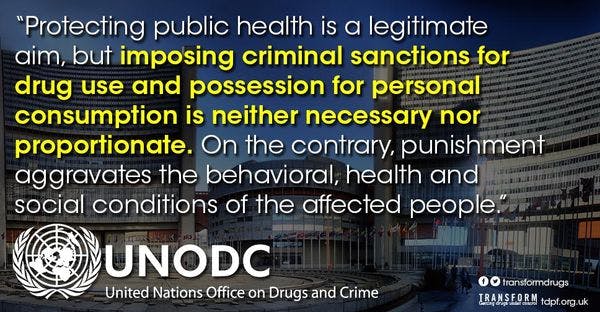The truth behind the UNODC's leaked decriminalisation paper
The United Nations Office on Drugs and Crime has responded to the ‘leak’ of its briefing paper calling for the decriminalisation of drug possession for personal use. Before considering this response, it’s important to be clear this wasn’t really a ‘leak’ in the classic sense. The document was to be presented by the UNODC at the International Harm Reduction Conference in Kuala Lumpur, and an embargoed copy had already gone to select media (the norm for such publication events). When it was then pulled at the last minute, the BBC, which had already filmed a news segment on it, decided to release it anyway. Richard Branson was filmed for the segment as a member of the Global Commission on Drug Policy, and was sufficiently annoyed when the UNODC backtracked, that he broke the story himself on his blog.
The UNODC response claims that the briefing is not a final or formal document, and does not amount to a statement of its policy position. It also rejects the allegation that the briefing was stopped from being launched as a result of political pressure. This does, however, feel distinctly like an organisation backtracking under pressure (even if that is something, of course, they would never own up to). It would certainly not be the first time member state presssure has led to supression of a controversial UN drugs paper. Its impossible to know what pressure might have been applied, but this report from New York Times at least strongly suggests that it was the US (as widely suspected) that derailed the publication (ironically having found out about it via a New York Times approach for comment).
Firstly, while the agency now says its decriminalisation paper “cannot be read as a statement of UNODC policy”, the paper itself explicitly says “This document clarifies the position of the UNODC”, before going on to deliver its damning critique of criminalisation and its recommendation to decriminalise personal drug possession and low-level drug dealing offences, all carefully referenced to the relevant UN statements, evidence and international law.
Secondly, it is entirely normal for departments within UN agencies (in this case the HIV/AIDS section of UNODC) to provide briefings and guidance on areas within their specific remit. In no way does every utterance from a UN agency require sign off from the director and board. Last year, for example, the World Health Organization recommended the decriminalisation of drug possession deep within a technical report on how to respond to HIV among key populations. Documents like this are quite rightly taken as statements of institutional positions – in the UNODC’s case, the paper’s own introduction sets the document up as clarification and guidance from a UN agency, not merely from an individual consultant or staffer.
Thirdly, to provide some context missing from much of the coverage, this is a guidance paper that has come about following longstanding pressure from, and discussions with, a range of civil society organisations, notably the International Drug Policy Consortium (IDPC), Harm Reduction International (HRI), and the International Network of People who Use Drugs (INPUD). They have demanded the UNODC clarify its position on decriminalisation – especially in light of evolving positions elsewhere in the UN. The UNODC committed to produce such a document almost two years ago. So to somehow suggest this has spontaneously appeared from one rogue staffer without thought or discussion is ludicrous. Contrary to the Telegraph’s reporting of the story, this document has in fact been developed and discussed internally within the UNODC, over a period of more than a year. Monica Beg and the UNODC’s HIV team – who the UNODC media spokesperson in Vienna has rather disgracefully been attempting to scapegoat – are in fact the heroes of the hour for driving this long overdue clarification through to publication.
It is also crucial to note that a range of other UN bodies and officials – including UNAIDS, the UN Development Programme, UN Women, the UN Office of the High Commissioner for Human Rights – have already clearly and publicly stated their support for decriminalisation.
Click here to read the full article.
Keep up-to-date with drug policy developments by subscribing to the IDPC Monthly Alert.
